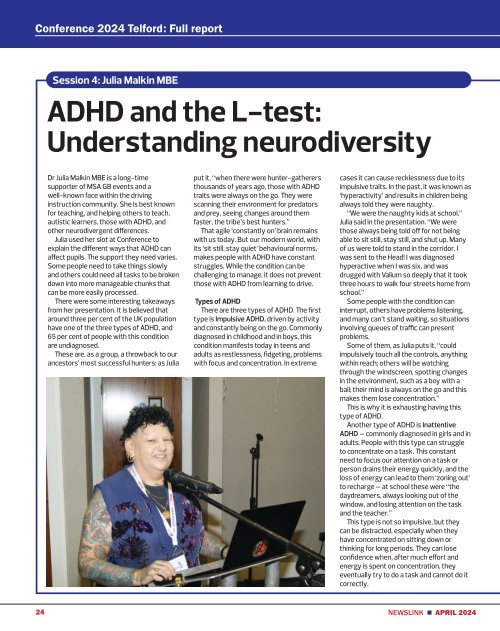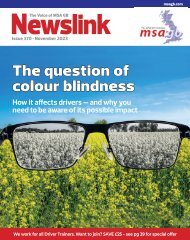Newslink April marketing special
Motor Schools Association of Great Britain - driving instructors - marketing and new members special. Road safety, driver training and testing
Motor Schools Association of Great Britain - driving instructors - marketing and new members special. Road safety, driver training and testing
Create successful ePaper yourself
Turn your PDF publications into a flip-book with our unique Google optimized e-Paper software.
Conference 2024 Telford: Full report<br />
Session 4: Julia Malkin MBE<br />
ADHD and the L-test:<br />
Understanding neurodiversity<br />
Dr Julia Malkin MBE is a long-time<br />
supporter of MSA GB events and a<br />
well-known face within the driving<br />
instruction community. She is best known<br />
for teaching, and helping others to teach,<br />
autistic learners, those with ADHD, and<br />
other neurodivergent differences.<br />
Julia used her slot at Conference to<br />
explain the different ways that ADHD can<br />
affect pupils. The support they need varies.<br />
Some people need to take things slowly<br />
and others could need all tasks to be broken<br />
down into more manageable chunks that<br />
can be more easily processed.<br />
There were some interesting takeaways<br />
from her presentation. It is believed that<br />
around three per cent of the UK population<br />
have one of the three types of ADHD, and<br />
65 per cent of people with this condition<br />
are undiagnosed.<br />
These are, as a group, a throwback to our<br />
ancestors’ most successful hunters: as Julia<br />
put it, “when there were hunter-gatherers<br />
thousands of years ago, those with ADHD<br />
traits were always on the go. They were<br />
scanning their environment for predators<br />
and prey, seeing changes around them<br />
faster, the tribe’s best hunters.”<br />
That agile ‘constantly on’ brain remains<br />
with us today. But our modern world, with<br />
its ‘sit still, stay quiet’ behavioural norms,<br />
makes people with ADHD have constant<br />
struggles. While the condition can be<br />
challenging to manage, it does not prevent<br />
those with ADHD from learning to drive.<br />
Types of ADHD<br />
There are three types of ADHD. The first<br />
type is Impulsive ADHD, driven by activity<br />
and constantly being on the go. Commonly<br />
diagnosed in childhood and in boys, this<br />
condition manifests today in teens and<br />
adults as restlessness, fidgeting, problems<br />
with focus and concentration. In extreme<br />
cases it can cause recklessness due to its<br />
impulsive traits. In the past, it was known as<br />
‘hyperactivity’ and results in children being<br />
always told they were naughty.<br />
“We were the naughty kids at school,”<br />
Julia said in the presentation. “We were<br />
those always being told off for not being<br />
able to sit still, stay still, and shut up. Many<br />
of us were told to stand in the corridor. I<br />
was sent to the Head! I was diagnosed<br />
hyperactive when I was six, and was<br />
drugged with Valium so deeply that it took<br />
three hours to walk four streets home from<br />
school.”<br />
Some people with the condition can<br />
interrupt, others have problems listening,<br />
and many can’t stand waiting, so situations<br />
involving queues of traffic can present<br />
problems.<br />
Some of them, as Julia puts it, “could<br />
impulsively touch all the controls, anything<br />
within reach; others will be watching<br />
through the windscreen, spotting changes<br />
in the environment, such as a boy with a<br />
ball; their mind is always on the go and this<br />
makes them lose concentration.”<br />
This is why it is exhausting having this<br />
type of ADHD.<br />
Another type of ADHD is Inattentive<br />
ADHD – commonly diagnosed in girls and in<br />
adults. People with this type can struggle<br />
to concentrate on a task. This constant<br />
need to focus our attention on a task or<br />
person drains their energy quickly, and the<br />
loss of energy can lead to them ‘zoning out’<br />
to recharge – at school these were “the<br />
daydreamers, always looking out of the<br />
window, and losing attention on the task<br />
and the teacher.”<br />
This type is not so impulsive, but they<br />
can be distracted, e<strong>special</strong>ly when they<br />
have concentrated on sitting down or<br />
thinking for long periods. They can lose<br />
confidence when, after much effort and<br />
energy is spent on concentration, they<br />
eventually try to do a task and cannot do it<br />
correctly.<br />
24 NEWSLINK n APRIL 2024
















